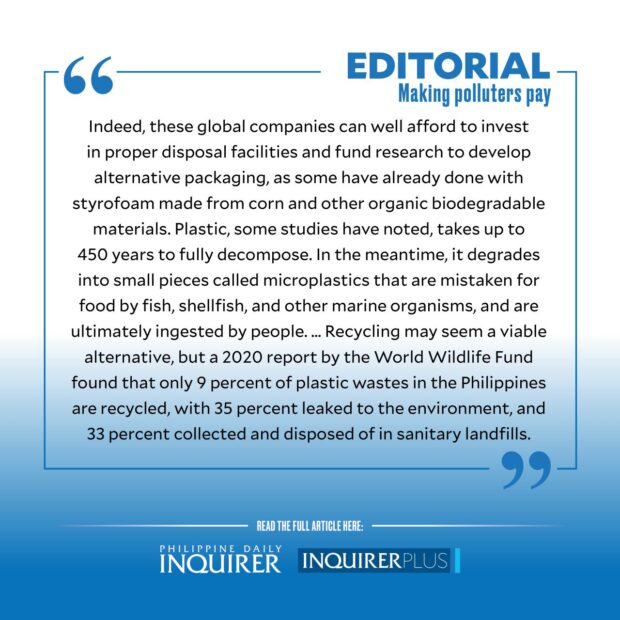Making polluters pay
 It’s a timely move amid news footage of entire towns gone underwater, thanks to heavy rainfall and rivers that overflow despite this being the height of the country’s dry season. The culprit in most urban areas are waterways clogged with solid waste, a big part of which are plastic packaging, including plastic bottles and sachets. This is not really surprising given that a 2015 study has identified the Philippines as the third worst plastic polluter in the world, with 1.88 million tons of plastic wastes produced every year.
It’s a timely move amid news footage of entire towns gone underwater, thanks to heavy rainfall and rivers that overflow despite this being the height of the country’s dry season. The culprit in most urban areas are waterways clogged with solid waste, a big part of which are plastic packaging, including plastic bottles and sachets. This is not really surprising given that a 2015 study has identified the Philippines as the third worst plastic polluter in the world, with 1.88 million tons of plastic wastes produced every year.
Republic Act No. 11898, or the Extended Producer Responsibility (EPR) Act of 2022 aims to remedy that, with the Department of Environment and Natural Resources forming a speakers’ bureau to communicate and promote compliance with the law. The agency has started a series of training in partnership with the United Nations Development Programme, “to equip its concerned workers with the proper knowledge and skills to effectively spread information about the EPR law” among stakeholders from the private sector, local government units (LGUs), and waste diversion organizations.
While there are ordinances in several cities in Metro Manila that regulate single-use plastic, including banning plastic bags for dry goods in supermarkets, they often put the burden on consumers. The EPR, on the other hand, places the responsibility solidly on plastic producers and companies that use it as packaging, requiring them to recover a certain percentage of their plastic wastes, or pay a fine of from P5 million to P20 million while risking suspension of their business permit on the third offense.
The law also sets incremental targets that companies must fulfill yearly in exchange for incentives and tax exemptions. For 2023, obliged companies must recover 20 percent of their plastic footprint from the year before. Covered by the EPR law are corporations with total assets of over P100 million, which are expected to allocate resources to support the collection, recovery, transport, processing, recycling, and disposal of plastic packaging wastes in ways that do not harm the environment.
And rightly so.
A September 2017 coastal cleanup of a reclamation area in Manila by the environmental group Greenpeace found that sachets of instant coffee, milk powder, food seasoning, shampoo, and toothpaste comprised 32.82 percent of the plastic wastes collected in the week-long activity. Many of the thin plastic and aluminum-packaged products are manufactured by giant multinationals and global brands.
“It’s time these companies stop [their] business-as-usual practices and use their resources to innovate and redesign their packaging and delivery solutions,” Greenpeace Philippines campaigner Abigail Aguilar said in a press conference in 2017.Indeed, these global companies can well afford to invest in proper disposal facilities and fund research to develop alternative packaging, as some have already done with styrofoam made from corn and other organic biodegradable materials. Plastic, some studies have noted, takes up to 450 years to fully decompose. In the meantime, it degrades into small pieces called microplastics that are mistaken for food by fish, shellfish, and other marine organisms, and are ultimately ingested by people. Incineration or burning plastic meanwhile releases toxic gases that contribute to global warming and climate change. Recycling may seem a viable alternative, but a 2020 report by the World Wildlife Fund found that only 9 percent of plastic wastes in the Philippines are recycled, with 35 percent leaked to the environment, and 33 percent collected and disposed of in sanitary landfills.
Based on the “polluter pays” principle, the EPR obligates companies that manufacture or use plastic packaging to assume full responsibility for the entire life cycle of harmful plastic waste, and pay for the cost of waste prevention, clean up, and recovery measures, a burden that LGUs cannot manage because of their limited resources.
Companies covered by the law can translate their responsibility into green measures that include segregating waste at source and collection and redesigning existing packaging to biodegradable materials. They can also put up collection centers where consumers can redeem deposits on glass and plastic bottles as well as aluminum cans, a practice popular in other countries.
But change is always difficult, and already, there are voices raised to defend the use of plastic as being more convenient for consumers; how switching from plastic to more sustainable materials could prove too expensive for small and micro enterprises, and how single-use sachets have made branded consumer goods more affordable to millions of low-income Filipinos.
It may not be an easy transition, but it is a necessary response to our country’s rapidly deteriorating environmental health. It is also a state, corporate, and individual commitment that we must embrace to keep the planet healthy, and to make sure that tomorrow’s Earth Day remains truly worth celebrating.




















